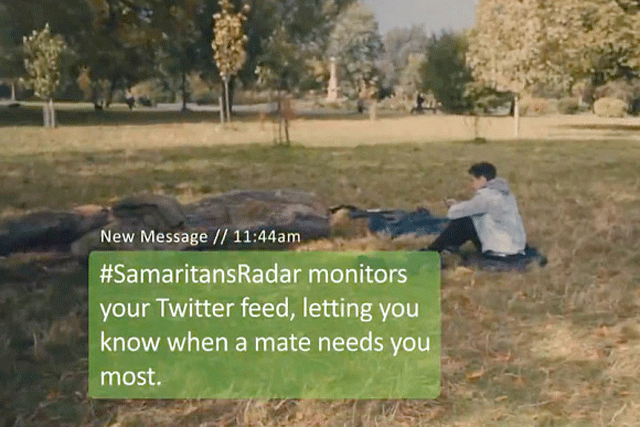
The suicide prevention charity yesterday launched Samaritans Radar, a web app for Twitter that allows users to keep an eye on vulnerable friends they follow by automatically scanning their tweets.
The app looks out for specific words or phrases that signals if a user may be a suicide risk. Phrases include "tired of being alone", "hate myself", "depressed" and "need someone to talk to".
That language will trigger a notification to the user, plus advice on next steps to take. The idea is to ensure users don't miss signs that a friend may be in trouble.
No one from Samaritans is going to contact you out of the blue because you've used certain language, and we're certainly not trying to encourage people to be censored
But tweeting under the dedicated #SamaritansRadar tag yesterday, a large number of users complained that the app, once enabled, does not explicity ask for permission to scan tweets.
They called for a dedicated "opt-out" mechanism and said the prospect of being monitored would stop them from posting anything online.
They added that the app could highlight vulnerable users to stalkers or online bullies, potentially causing harm.
Disappointing outcome
Joe Ferns, policy chief at Samaritans, said self-censorship would be a disappointing outcome for the charity.
"From Samaritans' perspective, that would be really disappointing, that's not what this is about," he said, in a video response.
He added: "No one from Samaritans is going to contact you out of the blue because you've used certain language, and we're certainly not trying to encourage people to be censored."
In a further statement, the charity of the service. A whitelisting function is already available for organisations, but it isn't immediately clear how this will work for individuals.
"The aim of the app is to look for potentially worrying tweets from people talking about their problems with the hope that their followers will respond to their Tweets - which are already public – and which otherwise may be missed," the company wrote in its post.
Self-censorship
One well-known privacy activist, , had criticised Samaritans for putting the onus on vulnerable users to watch what they say.
"It’s disturbing that in their supposed defence rather than taking a more critical view of their own responsibility to act ethically," he wrote.
Short noted that many users do not understand how their public information can be caught up in a dragnet.
"[The] bigger problem with things like public tweets is that no-one knows what information can be derived from them, either now or in the future," he wrote.
Every tweet is posted with a timestamp (time and date) and these can be hugely and unexpectedly revealing when analysed in bulk
"Every tweet is posted with a timestamp (time and date) and these can be hugely and unexpectedly revealing when analysed in bulk," he added. "Large changes in tweet volumes could be used to infer things about people’s health, mood and of course death."
Short, along with a number of other users, called for Samaritans to take its app offline.
Marketing understands that Samaritans will not be taking down the app, created with digital agency Jam, and that the service has received around 1,000 downloads.
It also appears that several users have complained to the Information Commissioner's Office (ICO).
The ICO confirmed to Marketing it was aware of complaints, and noted that all apps developed by organisations should respect user privacy.
A spokesman said: "We are aware of the concerns that have been raised about the privacy implications of the Samaritans Radar app and we will be speaking with the Samaritans to find out more about how this app works."
Read next


.jpg)


.jpg)